|
|
|
Sort Order |
|
|
|
Items / Page
|
|
|
|
|
|
|
| Srl | Item |
| 1 |
ID:
171218
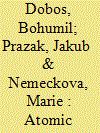

|
|
|
|
|
| Summary/Abstract |
Asteroid and comet collisions present low-chance, high-impact risks for the Earth. As such, it is unlikely that space powers will invest into capabilities aiming at the development of new deflection technologies leaving planetary defense with two readily available methods – kinetic impactor and nuclear warhead. Legally and normatively, the use of a nuclear device in outer space is in the current state of affairs forbidden. In the case of an emergency with an impending impact, such an approach is needed. This article suggests that establishment of an exception in international space law strengthens the nuclear regime while allowing for an effective deflection in the space domain if the need arises.
|
|
|
|
|
|
|
|
|
|
|
|
|
|
|
|
| 2 |
ID:
034588
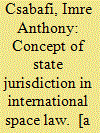

|
|
|
|
|
| Edition |
Csabafi
|
| Publication |
Hague, Martinus Nijhoff, 1971.
|
| Description |
xxvi, 197p.
|
| Standard Number |
9024750156
|
|
|
|
|
|
|
|
|
|
|
|
Copies: C:1/I:0,R:0,Q:0
Circulation
| Accession# | Call# | Current Location | Status | Policy | Location |
| 011224 | 341.46/CSA 011224 | Main | On Shelf | General | |
|
|
|
|
| 3 |
ID:
107707
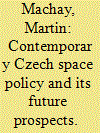

|
|
|
| 4 |
ID:
179861
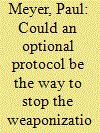

|
|
|
|
|
| Summary/Abstract |
Since the early 1980s, the United Nations General Assembly and its affiliated forum, the Conference on Disarmament in Geneva, has had the Prevention of an Arms Race in Outer Space issue on its agenda. In the intervening years, the threat of weapons being introduced into the outer space realm has waxed and waned, but, in the main, a benign environment free from man-made threats has prevailed, allowing for great strides in the exploration and use of space. Recently, a renewal of great power rivalry including the development of offensive “counter-space” capabilities has resurrected the spectre of armed conflict in space. With widespread political support for the non-weaponization of outer space, has the time come to give legal expression to this goal by means of an optional protocol to the 1967 Outer Space Treaty?
|
|
|
|
|
|
|
|
|
|
|
|
|
|
|
|
| 5 |
ID:
171215
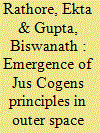

|
|
|
|
|
| Summary/Abstract |
International law concerning outer space is developing at a steady pace since humankind’s first step towards space exploration in 1958with the launch of Sputnik 1 and Explorer 1. Since then, space is a growing area of political and economic significance. While significant steps by the international community of states in the form of treaty obligations and principles in international space law are apparent, it is yet to be ascertained whether, and if at all, there are customary international laws or jus cogens principles in place regarding outer space and the issues of governance therein. This paper enumerates and discusses the different principles of outer space law and determines if these principles attain the status of jus cogens.
|
|
|
|
|
|
|
|
|
|
|
|
|
|
|
|
| 6 |
ID:
169305
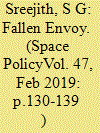

|
|
|
|
|
| Summary/Abstract |
This article revisits the legal status of astronauts by recounting the tale of their rise and fall in the International Space Law (ISL). ISL in its early years declared astronauts as envoys of mankind, although it later on entered into a state of forgetfulness of the term, replacing it with the more contemporaneous term “personnel.” Personnel brought a sense of everydayness and pragmatism to ISL as against the idealism attached to astronauts and to their status as the envoys of mankind's romantic collective. Spotlighting on this shift, this article argues that the term astronaut has, in fact, a semiotic effect in ISL that constantly evokes proud memories of human conquest of outer spaces. That is to say, in bestowing astronauts with the status of envoys of mankind, ISL mainly meant to record the remarkable feat of that day rather than actualizing astronauts in the deontological landscape of law. Later on, mindful of the burgeoning space activities and the need to regulate them, ISL espoused the term personnel to refer to space travelers. Today ISL governs the activities of personnel, whereas astronaut has a logocentric presence therein. Drawing on a relevant understanding of contemporary society and culture, the article concludes that astronauts have a legacy in law and society—they continue to exist as a cultural symbol in society and as a symbol of a culture in ISL.
|
|
|
|
|
|
|
|
|
|
|
|
|
|
|
|
| 7 |
ID:
169337
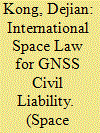

|
|
|
|
|
| Summary/Abstract |
GNSS-related activities qualify as ʻspace activities’, and it thus make international space law applicable. However, it is quite reticent to broadly interpret GNSS signals under the term ʻspace object’, due to the lack of material and physical properties. The discussions on whether GNSS damage qualifies as indirect damage, and whether the Liability Convention cover that indirect damage, are irrelevant to the applicability of GNSS damage to the outer space treaties. GNSS damage may apply Article VII of the Outer Space Treaty and the Liability Convention as long as the causal link between the damage and GNSS satellites (not GNSS signals) is unbroken, logical, foreseeable and not too remote under the sense of general international law.
|
|
|
|
|
|
|
|
|
|
|
|
|
|
|
|
| 8 |
ID:
119887
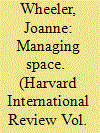

|
|
|
|
|
| Publication |
2011.
|
| Summary/Abstract |
In 1964, Arthur C. Clarke perceptively noted that "one day, we may have brain surgeons in Edinburgh operating on patients in New Zealand. When that time comes, the whole world would've shrunk to a point and the traditional role of the city as a meeting place for men would've ceased to make any sense. In fact, men will no longer commute-they will communicate." Clarke's comment predicts rather accurately some of the achievements in man's outer space activities since the Sputnik launch in 1957 and the signature of the Outer Space Treaty in 1967.
|
|
|
|
|
|
|
|
|
|
|
|
|
|
|
|
| 9 |
ID:
126955
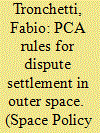

|
|
|
|
|
| Publication |
2013.
|
| Summary/Abstract |
Outer space activities have evolved significantly. While they were previously the exclusive domain of a restricted number of states, now thanks to technological advances and the easing of governmental restrictions, space activities are carried out on a much larger scale and involve subjects of both a governmental and non-governmental nature. Furthermore, the commercial uses of outer space are making space business increasingly profitable and attractive to potential investors. As the economic value of outer space activities, as well as the number of space actors grows, it is nearly inevitable that international disputes related to the use of outer space will occur. Until recently, international space law contained little dedicated machinery to settle international outer space-related disputes. This absence significantly weakened the applicability and enforceability of space law and contributed to a climate of uncertainty. In order to address these issues, the Permanent Court of Arbitration (PCA) adopted the Optional Rules for Arbitration of Disputes Relating to Outer Space Activities on 6 December 2011. The PCA Space Rules represent a significant development in the field of space law because they provide a voluntary and binding dispute settlement method accessible to all space actors and modeled on the specific legal and economic characteristics of space activities. This paper describes the genesis of the PCA Space Rules, assesses their content and innovative character, evaluates their possible implications for the settlement of outer space disputes, and argues that they should be positively received by the outer space community.
|
|
|
|
|
|
|
|
|
|
|
|
|
|
|
|
| 10 |
ID:
169329
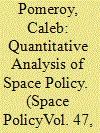

|
|
|
|
|
| Summary/Abstract |
Decades of space policy research have yielded an eclectic, multidisciplinary research agenda replete with findings that are relevant for theory and policy. Absent from the literature, however, is a systematic review and discussion of the data and research methods used to ascertain these findings. This is important for research progress because data and method choice have implications for the validity of the findings, potential contributions to theory, and efficacy of suggested policy prescriptions. Motivated by advances in computational social science, this article reviews the quantitative space policy literature and finds scope for further development with respect to data sources, method selection, and substantive topics of inquiry. Given these findings, two methodological areas are introduced, namely text and network analysis, and their utility is illustrated through an extension of a previous public opinion study, as well as a novel application regarding state support for international space law. This review might be relevant to scholars and practitioners interested in the empirical study of space policy.
|
|
|
|
|
|
|
|
|
|
|
|
|
|
|
|
| 11 |
ID:
169309
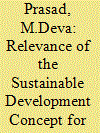

|
|
|
|
|
| Summary/Abstract |
This article provides an analysis of the concept of sustainable development in the context of current international space law. The extent of doctrinal conflicts and consensus of the international space law conventions and instruments with the concept of sustainable development could be well understood from this analysis. The result clearly indicates that there is consonance between the legal concept of sustainable development and international space law framework. At the same time, the article points out that the various issues relating to the long-term sustainable use of outer space and concerns faced because of a gap in international space law still exist. To curb this problem, it is important to improve the normative nature of international space law. The analysis helps in highlighting that incorporating the legal concept of sustainable development in a proactive manner into international space law would help in increasing the normative character as well as increasing its effectiveness.
|
|
|
|
|
|
|
|
|
|
|
|
|
|
|
|
|
|
|
|
|